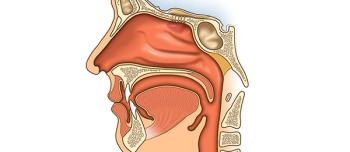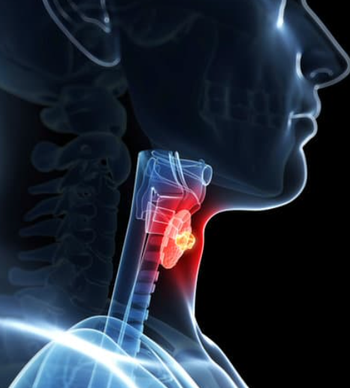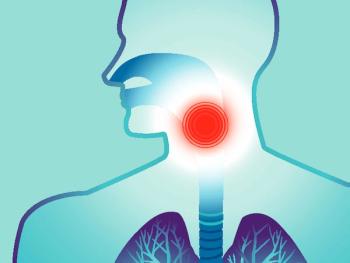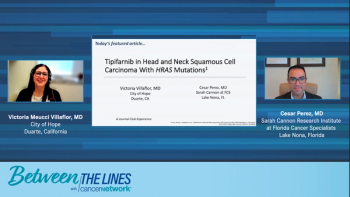
Patients with N0 to N1 nasopharyngeal carcinoma who received upper-neck radiation vs whole-neck radiation saw similar regional control with less radiation toxicity.

Your AI-Trained Oncology Knowledge Connection!


Patients with N0 to N1 nasopharyngeal carcinoma who received upper-neck radiation vs whole-neck radiation saw similar regional control with less radiation toxicity.

A qualitative analysis identified 4 themes that could be improved upon to help with symptom management in patients with head and neck cancer.

Investigators of the phase 3 RATIONALE-309 trial found an improvement in progression-free survival for patients with recurrent or metastatic nasopharyngeal cancer treated with tislelizumab plus chemotherapy vs chemotherapy alone.

Antitumor activity was noted for patients with recurrent or metastatic head and neck cancer who were treated with pepinemab plus pembrolizumab.

Patients with human papillomavirus–associated oropharyngeal carcinoma who were given de-escalated doses of radiotherapy saw a better quality of life and favorable outcomes.

Investigators believe that neoadjuvant chemotherapy may play a role in mandibular prevention in patients with oral cavity cancer.

A significant progression-free survival benefit was observed with the use of capecitabine maintenance therapy in newly diagnosed nasopharyngeal carcinoma vs best supportive care.

Patients with squamous cell carcinoma of the head and neck who had progressive disease following treatment with platinum-based chemotherapy and a checkpoint inhibitor experienced promising safety and preliminary efficacy following treatment with tisotumab vedotin.

Patients with early stage glottic larynx carcinoma benefitted from treatment with tumor-focused stereotactic radiotherapy.

Research presented at the 2022 Multidisciplinary Head and Neck Cancers Symposium highlighted the potential to detect oropharyngeal cancer recurrence using circulating tumor tissue modified viral–human papillomavirus DNA.

A presentation from the 2022 ASTRO Multidisciplinary Head and Neck Cancers Symposium showed a de-escalated radiotherapy dose to 54 Gy vs 70 Gy led to better measures of toxicity in those with p16+ oropharyngeal squamous cell carcinoma.

In a pre-planned pooled analysis of data from the MC1273 and MC1675 trials presented at the 2022 ASTRO Multidisciplinary Head and Neck Cancers Symposium, de-escalated adjuvant radiation therapy met criteria for efficacy in human papillomavirus–related oropharyngeal squamous cell carcinoma.

Findings indicate that patients with advanced or metastatic radioactive iodine–refractory differentiated thyroid cancer who received apatinib experienced a prolonged survival benefit vs placebo.

PDS Biotechnology Corporation announced that the combination of PDS0101 and pembrolizumab achieved preliminary response efficacy for patients with advanced human papillomavirus–associated head and neck cancer.

Abiraterone acetate and luteinizing hormone–releasing hormone agonist is a promising second-line option for androgen receptor–expressing castration resistant salivary gland cancer.

CUE-101 could be a potentially promising therapeutic agent for patients with recurrent/metastatic, HPV16-positive head and neck squamous cell carcinoma.

Use of a multimedia education platform appeared to compliment traditional education methods and provide complementary information on treatment and recovery for those with head and neck cancer.

Research indicated that non-Hispanic Black patients had significantly worse 5-year overall survival outcomes compared with Hispanic, Asian/Pacific Islander, and American Indian/Alaska Native patients.

Although findings suggest that close or positive surgical margins are associated with a higher risk of poor outcomes in salivary gland cancer, it did not appear to be an independent factor for poor outcomes after adjusting for tumor stage, histologic risk group, and adjuvant radiotherapy use.

Veteran survivors of head and neck cancer who experienced suicidal self-directed violence were found to most likely die from their injuries.

Patients with melanoma, head and neck squamous cell carcinoma, and cervical cancer who had not previously received immunotherapy and were treated with lifileucel plus pembrolizumab experienced promising overall response rates compared favorably with historical data on pembrolizumab monotherapy.

Cesar A. Perez, MD, and Victoria M. Villaflor, MD, discuss tipifarnib in patients with head and neck cancers harboring HRAS mutations.

Potential implications of ongoing studies evaluating tipifarnib for patients with HRAS-mutated head and neck squamous cell carcinoma.

Patients who received transoral robotic surgery for human papillomavirus–positive oropharynx squamous cell carcinoma were likely to experience pathologic extra nodal extension and positive margins following surgery.

CancerNetwork® sat down with Andrew Cook, MD, at the 2021 American Society for Radiation Oncology to talk about exciting trials in the head and neck space, including the phase 2 ORATER2 and phase 3 MC1675 trials.